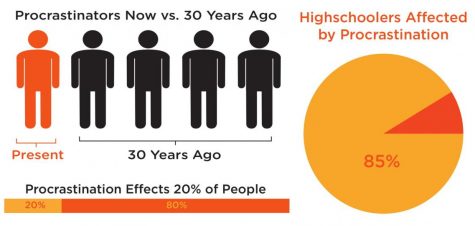Cramming: the prevalence of procrastination in the high school setting
Every high school student has been there, sitting in their room at 11PM at night, head in their hands, coming to the realization that you have yet to begin studying for the monstrous, terrorizing, content heavy, test that just happened to be tomorrow. You put yourself in this situation, you know that. But for some reason with these great responsibilities comes this dread of just getting started, whether it be taking notes, asking questions, or just studying in general. Because of this dread we put our responsibilities off later and later until…it’s the night before. But have no fear! You’ll just drink several cups of coffee, feed off of the buzz of adrenaline, and cram your way to success. Right? Wrong. With regards to cramming, new findings from UCLA say, don’t bother.

Senior Jordan Smith considers himself to be all too familiar with procrastination and late night cramming. “The last night I stayed up cramming was Monday night for the IB Math Studies IA,” explains Smith. That night, Smith stayed up until 2 AM, cramming to finish the 13 page mathematics internal assessment. Though he admits, “I probably have known about it for 2-3 months.” Unlike some highschool students who end up feeling upset with their end product or ill-prepared for the upcoming test, Smith says “I felt pretty good about it, it ended up to be pretty decent.” The reason for this late night cramming varies from student to student, however in most cases it is not the lack of time, it is the lack of stimulus that keeps them from not completing the assignment earlier. “My friends and I usually stay up late playing Fortnite so that definitely takes up time that I could be doing homework,” explains Smith. Smith goes onto explain that the nights after cramming he finds himself to be tired, due to his short amount of sleep.
In a study conducted by UCLA, researchers found that there lies a problem in choosing study over sleep. No one is saying that students shouldn’t study, “studying is a key contributor to academic achievement, but what students may fail to appreciate is that adequate sleep is also important for academics,” researchers say. Researchers went on to state that “students generally learn best when they keep a consistent study schedule, Although a steady pace of learning is ideal, the increasing demands that high school students face may make such a consistent schedule difficult. Socializing with peers and working, for example, both increase across the course of high school. So do academic obligations like homework that require more time and effort.”
Outside of lack of sleep, cramming can also lead to unsettling amounts of stress and anxiety. Cramming certainly doesn’t bring on feelings of confidence and relaxation, it’s stressful. Not only does this habit of cramming amplify stress, but this stress could also lead to poor test scores, test anxiety, and even the inability to absorb information. When we cram, we feel overwhelmed at the body of work we have created for ourselves and we panic. Researchers at Landic University have found that because of this, cramming can lead to a negative association with academic materials to the point where even looking at assignments or opening textbooks can give you anxiety.
Furthermore, research has shown that you need to be exposed to the material at hand several times before you test on it. Thus, only looking at the material the night before the due date, may not land you an A+. In some ways, your brain is like a sponge and it can only absorb so much information in one setting. Getting in the habit of cramming and procrastination can lead to an overall deterioration of your grade point. Houghton College reports that “students who cram for tests are at a disadvantage on test day because they’re nervous, tired, and probably hungry. They also have likely had little practice with recall and application and have not had the opportunity to remember the material. Therefore, they perform more poorly on tests. Shorter, repeat study sessions are a much more effective way to prepare and will result in higher scores.”
So how do you break the habit of cramming? The key is time management and prioritizing things in your life that are important to you. It is important to assess exactly what you need to get done on a weekly basis. Making lists of assignments can help, as well as listing what else, outside of homework, you want to complete in that given week. Whether it be hanging out with friends, hitting up the gym, or even just time to catch up on sleep. Making time for things outside of assignments is essential in time management and also allows for you to leave time for yourself and allow yourself time to recuperate, because everyone has those days, weeks, or even months, that seem to be filled with oodles and oodles of assignments. Instead of cramming, procrastinating, and ignoring; handle those assignments with good intentions based on time management skills and the overall intention of wanting to do well in a subject field whether it be in school, or even life in general.

I have been a member of the NL staff for 3 years. My favorite pieces to write are opinion and feature! Joining the staff has been one of my best decisions...




Lexi Kava • Mar 6, 2018 at 11:58 am
Awesome article! You’re coverage is super relevant!
Ben Lewis • Mar 6, 2018 at 11:55 am
We’ve all been there. Some (including me) more than others haha. Great article Lexi 🙂 You should have interviewed a friend of ours who tends to procrastinate… a lot.
Brianna Neuhouser • Mar 6, 2018 at 11:44 am
I know this struggle too well and I appreciate someone coming at it from a knowledgeable way instead of attacking kids who procrastinate then cram